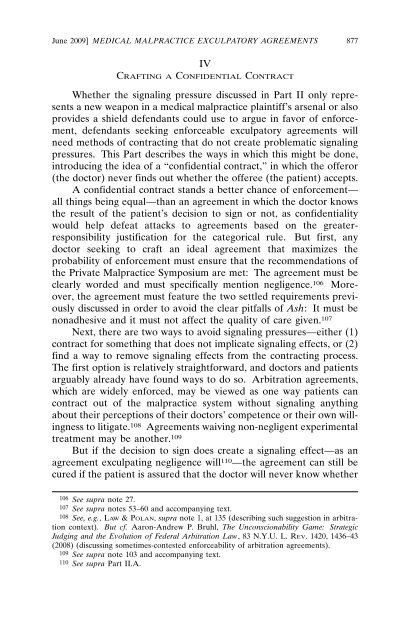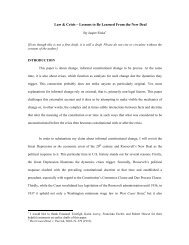In Search of an Enforceable Medical Malpractice Exculpatory
In Search of an Enforceable Medical Malpractice Exculpatory
In Search of an Enforceable Medical Malpractice Exculpatory
You also want an ePaper? Increase the reach of your titles
YUMPU automatically turns print PDFs into web optimized ePapers that Google loves.
June 2009] MEDICAL MALPRACTICE EXCULPATORY AGREEMENTS 877<br />
IV<br />
CRAFTING A CONFIDENTIAL CONTRACT<br />
Whether the signaling pressure discussed in Part II only represents<br />
a new weapon in a medical malpractice plaintiff’s arsenal or also<br />
provides a shield defend<strong>an</strong>ts could use to argue in favor <strong>of</strong> enforcement,<br />
defend<strong>an</strong>ts seeking enforceable exculpatory agreements will<br />
need methods <strong>of</strong> contracting that do not create problematic signaling<br />
pressures. This Part describes the ways in which this might be done,<br />
introducing the idea <strong>of</strong> a “confidential contract,” in which the <strong>of</strong>feror<br />
(the doctor) never finds out whether the <strong>of</strong>feree (the patient) accepts.<br />
A confidential contract st<strong>an</strong>ds a better ch<strong>an</strong>ce <strong>of</strong> enforcement—<br />
all things being equal—th<strong>an</strong> <strong>an</strong> agreement in which the doctor knows<br />
the result <strong>of</strong> the patient’s decision to sign or not, as confidentiality<br />
would help defeat attacks to agreements based on the greaterresponsibility<br />
justification for the categorical rule. But first, <strong>an</strong>y<br />
doctor seeking to craft <strong>an</strong> ideal agreement that maximizes the<br />
probability <strong>of</strong> enforcement must ensure that the recommendations <strong>of</strong><br />
the Private <strong>Malpractice</strong> Symposium are met: The agreement must be<br />
clearly worded <strong>an</strong>d must specifically mention negligence. 106 Moreover,<br />
the agreement must feature the two settled requirements previously<br />
discussed in order to avoid the clear pitfalls <strong>of</strong> Ash: It must be<br />
nonadhesive <strong>an</strong>d it must not affect the quality <strong>of</strong> care given. 107<br />
Next, there are two ways to avoid signaling pressures—either (1)<br />
contract for something that does not implicate signaling effects, or (2)<br />
find a way to remove signaling effects from the contracting process.<br />
The first option is relatively straightforward, <strong>an</strong>d doctors <strong>an</strong>d patients<br />
arguably already have found ways to do so. Arbitration agreements,<br />
which are widely enforced, may be viewed as one way patients c<strong>an</strong><br />
contract out <strong>of</strong> the malpractice system without signaling <strong>an</strong>ything<br />
about their perceptions <strong>of</strong> their doctors’ competence or their own willingness<br />
to litigate. 108 Agreements waiving non-negligent experimental<br />
treatment may be <strong>an</strong>other. 109<br />
But if the decision to sign does create a signaling effect—as <strong>an</strong><br />
agreement exculpating negligence will 110 —the agreement c<strong>an</strong> still be<br />
cured if the patient is assured that the doctor will never know whether<br />
106 See supra note 27.<br />
107 See supra notes 53–60 <strong>an</strong>d accomp<strong>an</strong>ying text.<br />
108 See, e.g., LAW & POLAN, supra note 1, at 135 (describing such suggestion in arbitration<br />
context). But cf. Aaron-Andrew P. Bruhl, The Unconscionability Game: Strategic<br />
Judging <strong>an</strong>d the Evolution <strong>of</strong> Federal Arbitration Law, 83 N.Y.U. L. REV. 1420, 1436–43<br />
(2008) (discussing sometimes-contested enforceability <strong>of</strong> arbitration agreements).<br />
109 See supra note 103 <strong>an</strong>d accomp<strong>an</strong>ying text.<br />
110 See supra Part II.A.
















